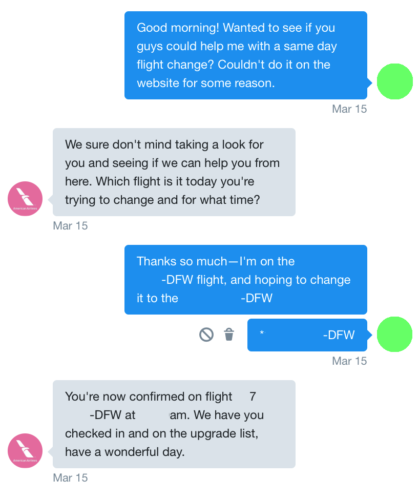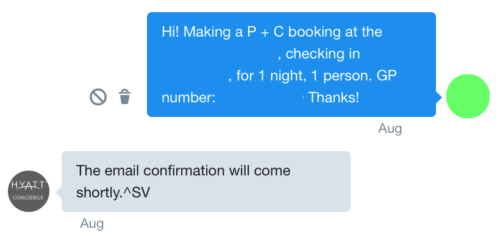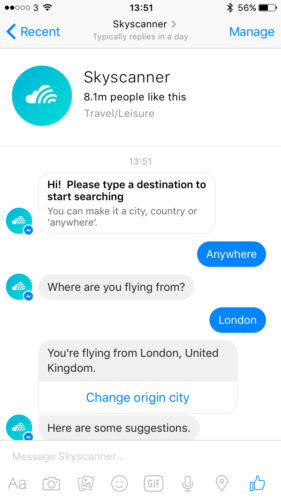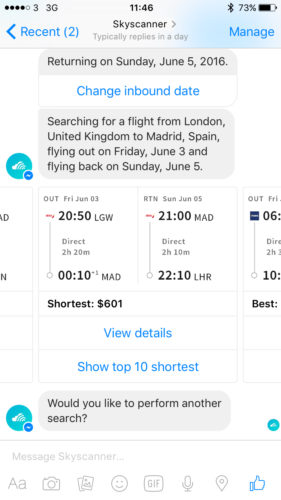Over the past few years, social media has become one of the best channels to get customer service from airlines and hotels. Instead of being on hold on the phone, I can type up a quick tweet and get a quick response. I have also found agents on Twitter to be much more friendly and helpful, and having a “paper trail” definitely helps with clear communications as well.
For example, one time I needed to do a same-day flight change. I reached out to American Airlines on Twitter, and an agent was able to confirm me on a flight in just a few minutes:

An American Airlines agent helped me rebook a flight on Twitter
The same goes with hotel chains. Back in the days Hyatt didn’t make points + cash availability visible online, and I would use Twitter to book most of my stays. It takes just one direct message—quick and easy.

A Hyatt agent on Twitter was able to book my points + cash stay
Companies can find it helpful to provide help on social media channels as well. Customers don’t have to wait, there won’t be awkward pauses, and the agents only send out the information once they are ready. Once an account is tied to an account, there is also no need to verify the customer’s identity with very interaction.
It’s no surprise, then, that airlines are quickly expanding their offerings on social media. Earlier this year, KLM added a string of features on Facebook Messenger. They can send you booking confirmations, provide flight status updates, or send you a message when check-in is open. You can even get your boarding pass via Facebook Messenger! All of the interactions are built on Facebook’s Messenger Platform, which enables companies to build “bots” for interactions with customers. To launch an interaction, simply send them a message like you would to other Facebook friends.
Of course, in-app interactions isn’t new. One famous example is China’s WeChat, which I think serves as a strong basis for what Facebook hopes to accomplish with Messenger. WeChat is basically a “super app”; it’s Facebook, Twitter, Instagram, Uber, Venmo, Skype, Tinder, etc. all in one. But it’s also so much more. As the New York Times video below shows, you can chat with friends about having dinner, make a reservation for a table, grab a taxi to the restaurant, order from the menu, take a picture of your food, review the dish, pay for dinner, all without leaving a single app. That’s pretty incredible, and I would highly recommend this 5-minute video below:
In a way, I think Icelander’s latest app rollout gives us a glimpse at the future, or at least where we might be headed. You can now book a flight—from searching, to paying, to selecting your seat—all within Facebook Messenger. For those who already dwell in Facebook Messenger, this can be extremely convenient. For others, this might seem like a waste of time, since you’d have to respond to individual question when booking a flight. I’d argue that it sure beats talking to someone over the phone, but then again someone who still books tickets over the phone probably isn’t Icelandair’s target demographics with this rollout.
But it’s not just airlines and hotels—aggregate site are joining in on the action. Skyscanner, a flight search engine like Google Flights, has launched their very own Facebook Messenger bot. A few quick messages, and they will show you the lowest fare available.


Skyscanner’s Facebook Messenger bot
As a self-proclaimed tech savvy guy, I am excited about the future of customer service. However, I also have to wonder: is this just basically a call menu or phone tree in text form? What if, instead of saying “Press 1 for New Reservations” or “Say ‘Check my Flight Status'” on the phone, you are simply typing it to a bot? After all, the formula that makes Twitter such a great venue for customer service is real agents + short but meaningful interactions.
If Facebook Messenger is nothing but a phone tree and Twitter agent wrapped into one, I am not sure I see its value. However, artificial intelligence is an ever-changing field, and I remain optimistic that companies can find great uses for it that customers will actually embrace and enjoy.
Have you used a Facebook Messenger bot in a customer service interaction?
The responses below are not provided or commissioned by the bank advertiser. Responses have not been reviewed, approved or otherwise endorsed by the bank advertiser. It is not the bank advertiser's responsibility to ensure all posts and/or questions are answered.
1 comment
Agree with you; a phone tree is not useful. We believe there will be massive innovations around the Facebook Messenger bots.
We are using Artificial Intelligence to transform travel booking. Our limited beta is currently on Facebook Messenger.